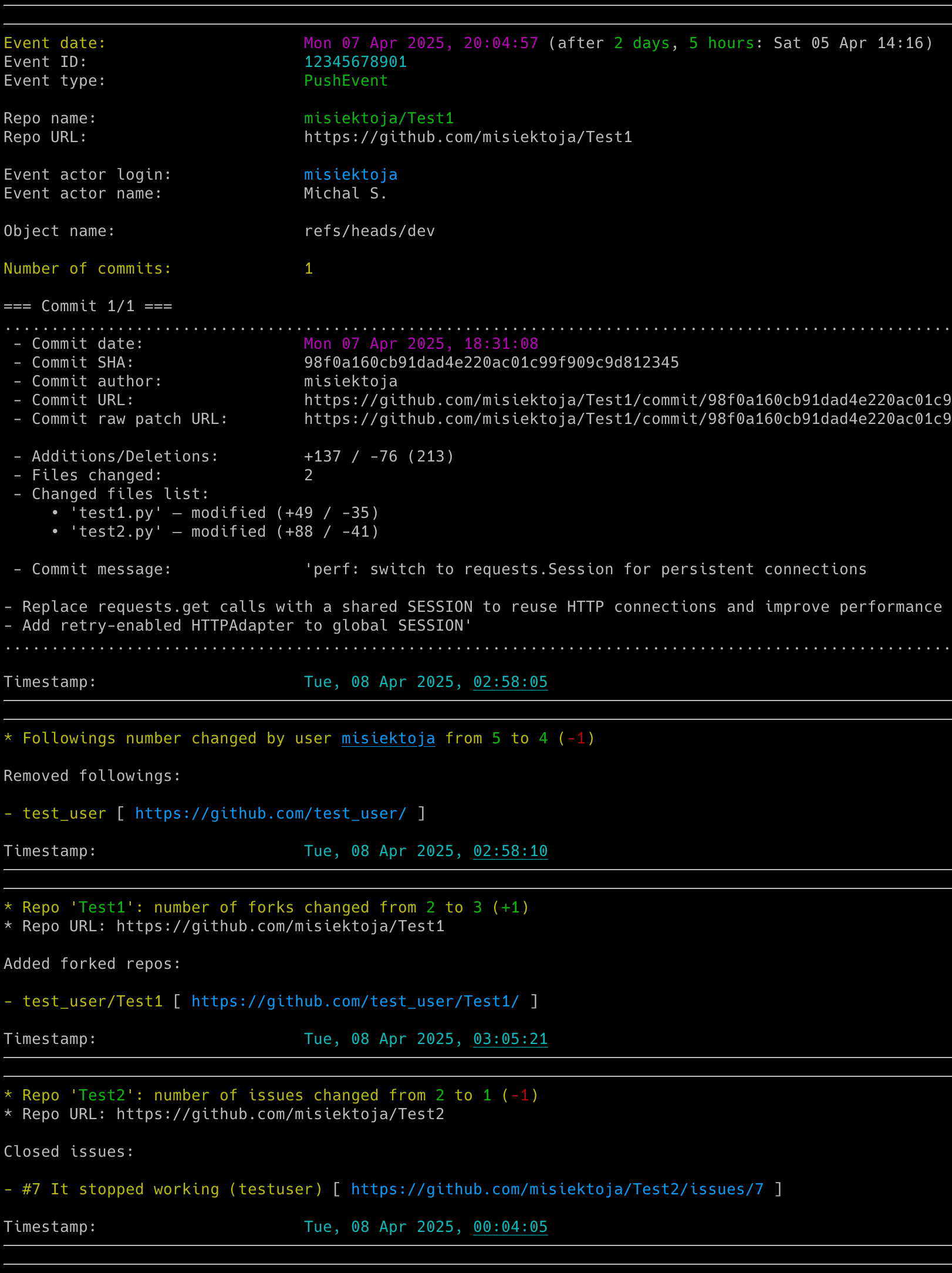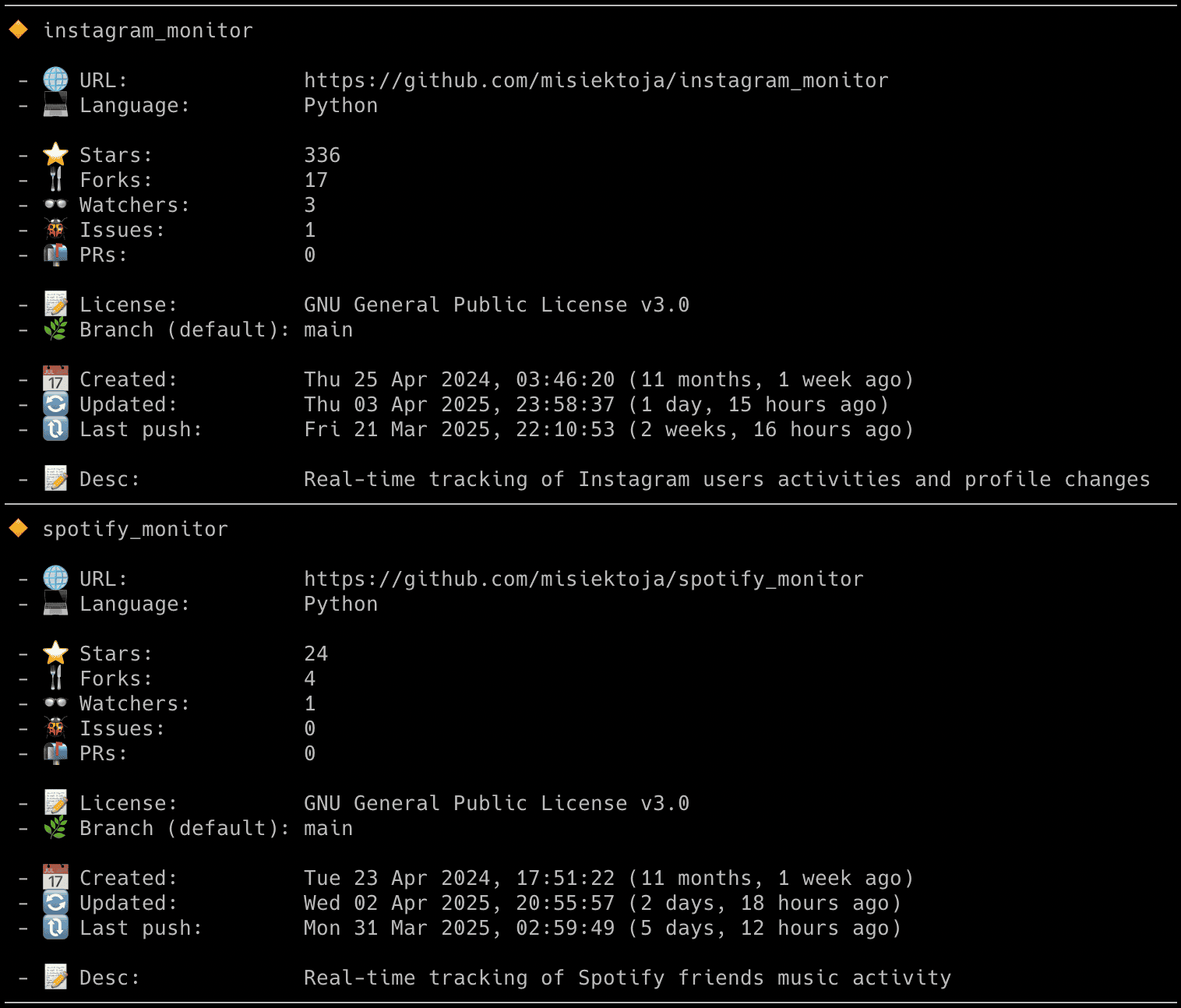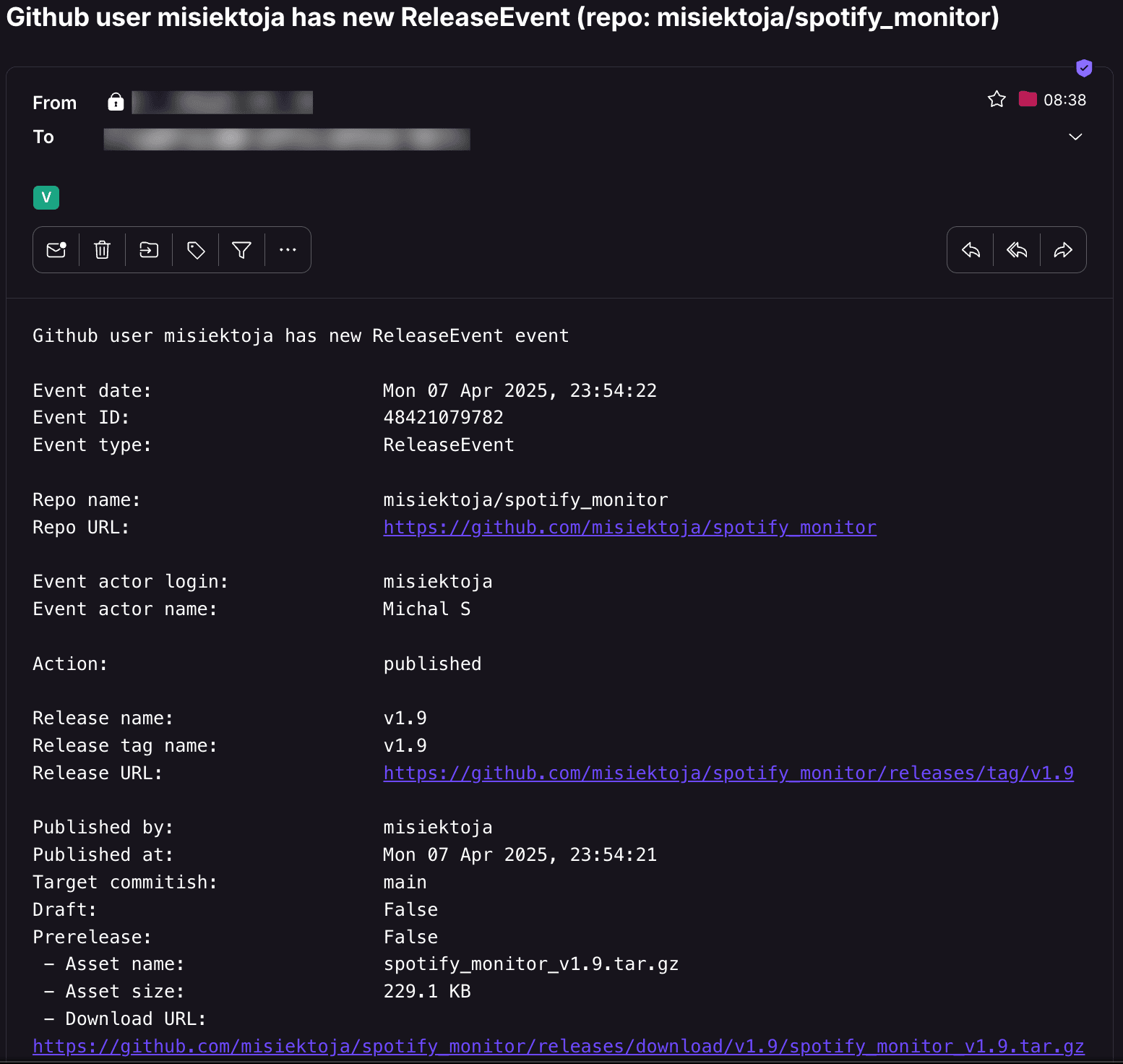OSINT tool for real-time monitoring of GitHub users' activities, including profile and repository changes.
- Real-time tracking of GitHub users' activities, including profile and repository changes:
- new GitHub events for the user like new pushes, PRs, issues, forks, releases, reviews etc.
- repository changes such as updated stargazers, watchers, forks, issues, PRs, description and repo update dates
- added/removed followings and followers
- added/removed starred repositories
- added/removed public repositories
- changes in user name, email, location, company, bio and blog URL
- changes in profile visibility (public to private and vice versa)
- detection when a user blocks or unblocks you
- detection of account metadata changes (such as account update date)
- Email notifications for different events (new GitHub events, changed followings, followers, repositories, user name, email, location, company, bio, blog URL etc.)
- Saving all user activities with timestamps to the CSV file
- Clickable GitHub URLs printed in the console & included in email notifications (repos, PRs, commits, issues, releases etc.)
- Possibility to control the running copy of the script via signals
- Support for Public Web GitHub and GitHub Enterprise
- Python 3.10 or higher
- Libraries: PyGithub,
requests,python-dateutil,pytz,tzlocal,python-dotenv
Tested on:
- macOS: Ventura, Sonoma, Sequoia
- Linux: Raspberry Pi OS (Bullseye, Bookworm), Ubuntu 24, Rocky Linux 8.x/9.x, Kali Linux 2024/2025
- Windows: 10, 11
It should work on other versions of macOS, Linux, Unix and Windows as well.
pip install github_monitorDownload the github_monitor.py file to the desired location.
Install dependencies via pip:
pip install PyGithub requests python-dateutil pytz tzlocal python-dotenvAlternatively, from the downloaded requirements.txt:
pip install -r requirements.txt- Grab your GitHub personal access token and track the
github_usernameactivities:
github_monitor <github_username> -t "your_github_classic_personal_access_token"Or if you installed manually:
python3 github_monitor.py <github_username> -t "your_github_classic_personal_access_token"To get the list of all supported command-line arguments / flags:
github_monitor --helpMost settings can be configured via command-line arguments.
If you want to have it stored persistently, generate a default config template and save it to a file named github_monitor.conf:
github_monitor --generate-config > github_monitor.conf
Edit the github_monitor.conf file and change any desired configuration options (detailed comments are provided for each).
Go to your GitHub Apps settings: https://github.com/settings/apps
Then click Personal access tokens → Tokens (classic) → Generate new token (classic).
Provide the GITHUB_TOKEN secret using one of the following methods:
- Pass it at runtime with
-t/--github-token - Set it as an environment variable (e.g.
export GITHUB_TOKEN=...) - Add it to .env file (
GITHUB_TOKEN=...) for persistent use - Fallback: hard-code it in the code or config file
If you store the GITHUB_TOKEN in a dotenv file you can update its value and send a SIGHUP signal to reload the file with the new token without restarting the tool. More info in Storing Secrets and Signal Controls (macOS/Linux/Unix).
By default the tool uses Public Web GitHub API URL: https://api.github.com
If you want to use GitHub Enterprise API URL then change GITHUB_API_URL (or use -x flag) to: https://{your_hostname}/api/v3
You can limit the type of events that will be monitored and reported by the tool. You can do it by changing the EVENTS_TO_MONITOR configuration option.
By default all events are monitored, but if you want to limit it, then remove the ALL keyword and leave the events you are interested in, for example:
EVENTS_TO_MONITOR=['PushEvent','PullRequestEvent', 'IssuesEvent', 'ForkEvent', 'ReleaseEvent']
By default, time zone is auto-detected using tzlocal. You can set it manually in github_monitor.conf:
LOCAL_TIMEZONE='Europe/Warsaw'You can get the list of all time zones supported by pytz like this:
python3 -c "import pytz; print('\n'.join(pytz.all_timezones))"If you want to use email notifications functionality, configure SMTP settings in the github_monitor.conf file.
Verify your SMTP settings by using --send-test-email flag (the tool will try to send a test email notification):
github_monitor --send-test-emailIt is recommended to store secrets like GITHUB_TOKEN or SMTP_PASSWORD as either an environment variable or in a dotenv file.
Set environment variables using export on Linux/Unix/macOS/WSL systems:
export GITHUB_TOKEN="your_github_classic_personal_access_token"
export SMTP_PASSWORD="your_smtp_password"On Windows Command Prompt use set instead of export and on Windows PowerShell use $env.
Alternatively store them persistently in a dotenv file (recommended):
GITHUB_TOKEN="your_github_classic_personal_access_token"
SMTP_PASSWORD="your_smtp_password"By default the tool will auto-search for dotenv file named .env in current directory and then upward from it.
You can specify a custom file with DOTENV_FILE or --env-file flag:
github_monitor <github_username> --env-file /path/.env-github_monitorYou can also disable .env auto-search with DOTENV_FILE = "none" or --env-file none:
github_monitor <github_username> --env-file noneAs a fallback, you can also store secrets in the configuration file or source code.
To monitor specific user activities and profile changes, simply enter the GitHub username as a command-line argument (github_username in the example below):
github_monitor github_usernameIt will track all user profile changes (e.g. changed followers, followings, starred repositories, username, email, bio, location, blog URL, number of repositories) and also all GitHub events (e.g. new pushes, PRs, issues, forks, releases etc.).
If you have not set GITHUB_TOKEN secret, you can use -t flag:
github_monitor github_username -t "your_github_classic_personal_access_token"By default, the tool looks for a configuration file named github_monitor.conf in:
- current directory
- home directory (
~) - script directory
If you generated a configuration file as described in Configuration, but saved it under a different name or in a different directory, you can specify its location using the --config-file flag:
github_monitor <github_username> --config-file /path/github_monitor_new.confIf you want to monitor changes to user's public repositories (e.g. new stargazers, watchers, forks, changed descriptions etc.) then use the -j flag:
github_monitor github_username -jBy default, only user-owned repos are tracked. To include forks and collaborations, set GET_ALL_REPOS to True or use the -a flag:
github_monitor github_username -j -aIf for any reason you do not want to monitor GitHub events for the user (e.g. new pushes, PRs, issues, forks, releases etc.), then use the -k flag:
github_monitor github_username -kThe tool runs until interrupted (Ctrl+C). Use tmux or screen for persistence.
You can monitor multiple GitHub users by running multiple instances of the script.
The tool automatically saves its output to github_monitor_<username>.log file. It can be changed in the settings via GITHUB_LOGFILE configuration option or disabled completely via DISABLE_LOGGING / -d flag.
There is another mode of the tool that displays various requested information (-r, -g, -f and -l flags).
If you want to display a list of public repositories (with some basic statistics) for the user then use the -r flag:
github_monitor github_username -rBy default, only user-owned repos are listed. To include forks and collaborations, set GET_ALL_REPOS to True or use the -a flag:
github_monitor github_username -r -aIf you want to display a list of repositories starred by the user then use the -g flag:
github_monitor github_username -gIf you want to display a list of followers and followings for the user then use the -f flag.
github_monitor github_username -fIf you want to get the list of recent GitHub events for the user then use the -l flag. You can also add the -n flag to specify how many events should be displayed. By default, it shows the last 5 events.
github_monitor github_username -l -n 10If you want to not only display, but also save the list of recent GitHub events to a CSV file, use the -l flag with -b indicating the CSV file. As before, you can add the -n flag to specify how many events should be displayed/saved:
github_monitor github_username -l -n 10 -b github_username.csvTo enable email notifications for all user profile changes (e.g. changes in followers, followings, starred repositories, username, email, bio, location, blog URL and number of repositories):
- set
PROFILE_NOTIFICATIONtoTrue - or use the
-pflag
github_monitor github_username -pTo receive email notifications when new GitHub events appear for the user (e.g. new pushes, PRs, issues, forks, releases etc.):
- set
EVENT_NOTIFICATIONtoTrue - or use the
-sflag
github_monitor github_username -sTo get email notifications when changes in user repositories are detected (e.g. changes in stargazers, watchers, forks, descriptions, etc., except for the update date):
- set
REPO_NOTIFICATIONtoTrue - or use the
-qflag
github_monitor github_username -qTo be informed whenever changes in the update date of user repositories are detected:
- set
REPO_UPDATE_DATE_NOTIFICATIONtoTrue - or use the
-uflag
github_monitor github_username -uThe last two options (-q and -u) only work if tracking of repositories changes is enabled (-j).
To disable sending an email on errors (enabled by default):
- set
ERROR_NOTIFICATIONtoFalse - or use the
-eflag
github_monitor github_username -eYou can combine all email notifications flags together if needed.
Make sure you defined your SMTP settings earlier (see SMTP settings).
Example email:
If you want to save all GitHub user events, profile changes and repository updates to a CSV file, set CSV_FILE or use -b flag:
github_monitor <github_username> -b github_username.csvThe file will be automatically created if it does not exist.
If you want to customize the polling interval, use -c flag (or GITHUB_CHECK_INTERVAL configuration option):
github_monitor <github_username> -c 900It is generally not recommended to use values lower than 10 minutes as new events are very often delayed by GitHub API.
The tool has several signal handlers implemented which allow to change behavior of the tool without a need to restart it with new configuration options / flags.
List of supported signals:
| Signal | Description |
|---|---|
| USR1 | Toggle email notifications for all user's profile changes (-p) |
| USR2 | Toggle email notifications for new GitHub events (-s) |
| CONT | Toggle email notifications for user's repositories changes (except for update date) (-q) |
| PIPE | Toggle email notifications for user's repositories update date changes (-u) |
| TRAP | Increase the user check interval (by 1 min) |
| ABRT | Decrease the user check interval (by 1 min) |
| HUP | Reload secrets from .env file |
Send signals with kill or pkill, e.g.:
pkill -USR1 -f "github_monitor <github_username>"As Windows supports limited number of signals, this functionality is available only on Linux/Unix/macOS.
You can use GRC to color logs.
Add to your GRC config (~/.grc/grc.conf):
# monitoring log file
.*_monitor_.*\.log
conf.monitor_logs
Now copy the conf.monitor_logs to your ~/.grc/ and log files should be nicely colored when using grc tool.
Example:
grc tail -F -n 100 github_monitor_<username>.logSee RELEASE_NOTES.md for details.
Licensed under GPLv3. See LICENSE.


